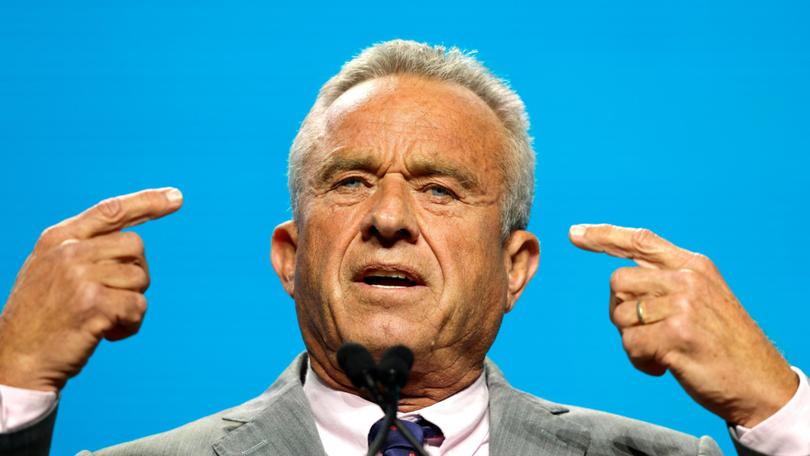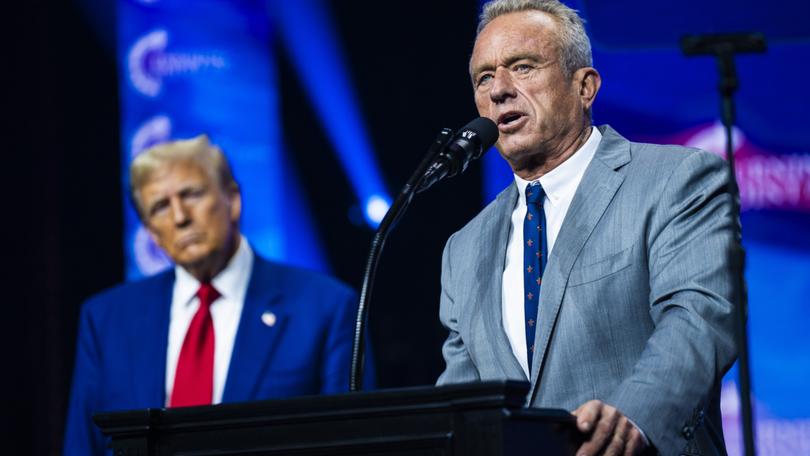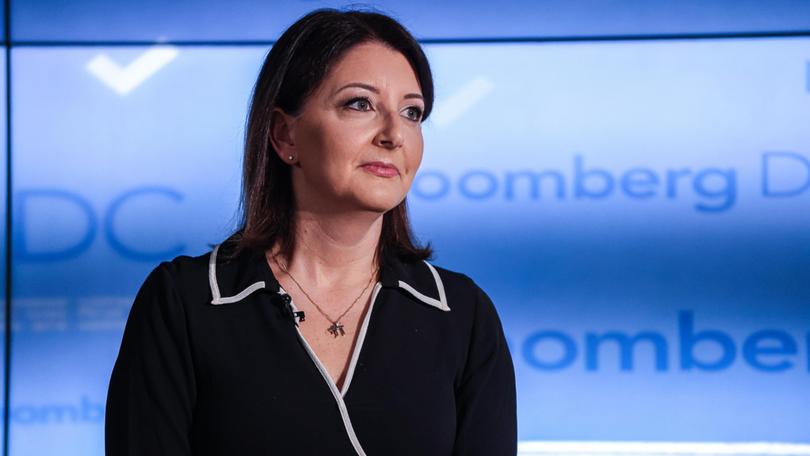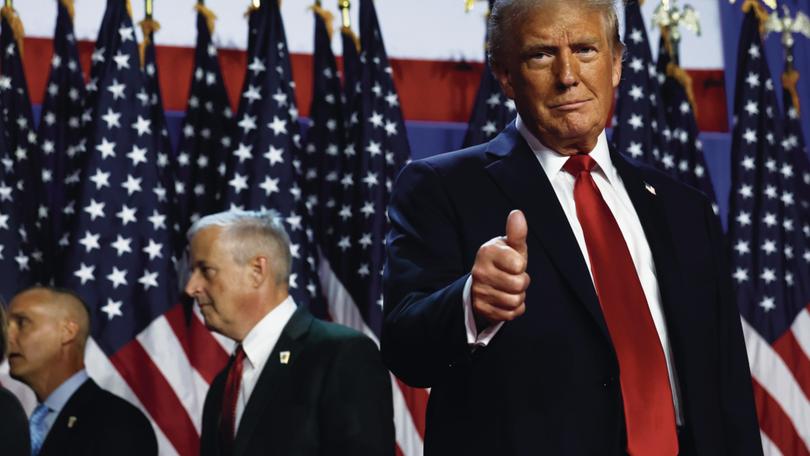Trump’s choice to lead US health is anti-vaccine, a fluoride sceptic and a hydroxychloroquine champion
Robert F. Kennedy Jr: The anti-vaccine campaigner, fluoride sceptic, hydroxychloroquine champion, and descendent of Democrats royalty is Trump’s polarising choice to lead the US’s health agencies

President-elect Donald Trump on Thursday selected Robert F. Kennedy Jr., a longtime vaccine sceptic, to lead the Department of Health and Human Services, the sprawling agency responsible for administering millions of Americans’ health insurance, approving drugs and medical supplies, regulating food, and responding to infectious-disease outbreaks.
Kennedy, who in August suspended his own bid for president in hopes of winning a spot in a Trump administration, has pledged to make fighting chronic disease his signature cause.
Sign up to The Nightly's newsletters.
Get the first look at the digital newspaper, curated daily stories and breaking headlines delivered to your inbox.
By continuing you agree to our Terms and Privacy Policy.“The Safety and Health of all Americans is the most important role of any Administration, and HHS will play a big role in helping ensure that everybody will be protected from harmful chemicals, pollutants, pesticides, pharmaceutical products, and food additives that have contributed to the overwhelming Health Crisis in this Country,” Trump wrote in a post on the social media platform X on Thursday afternoon.
The decision, which public health experts and many Democrats characterised as alarming and unprecedented, means that one of America’s most prominent vaccine sceptics could soon oversee an agency responsible for the safety of vaccines.
Mr Kennedy did not immediately reply to a request for comment.

Mr Kennedy, founder of a major anti-vaccine group, has long criticised the Centers for Disease Control and Prevention’s recommended list of childhood immunisations, promoting debunked claims about vaccines’ link to autism.
He has argued that federal agencies have not done enough research on the shots that hundreds of millions of Americans have received to protect them from measles, flu and other infectious diseases.
His claims are rejected by health officials who say that vaccines have been thoroughly studied and are responsible for ending threats such as polio in the United States.
“We’ve had people nominated for the job we disagreed with on policy and ideology, but I’m unaware of anyone who’s been nominated for this job that we can’t trust what they say,” said Georges C. Benjamin, longtime executive director of the American Public Health Association.
Mandy Cohen, the CDC’s director, said she was concerned by Kennedy’s selection.
“I don’t want to go backwards and see children or adults suffer or lose their lives to remind us that vaccines work,” Ms Cohen wrote in a text message.
Senate Democrats also castigated Trump’s decision, with Washington Democrat Senator Patty Murray dismissing Kennedy as a “fringe conspiracy theorist,” and Oregon Democrat Senator Ron Wyden condemning his “outlandish views on basic scientific facts”.
Mr Kennedy has no experience in a senior government role, and former Trump health officials on Thursday warned that he would probably face battles in trying to navigate HHS’s bureaucracy and achieve his agenda.

But the news was hailed by wellness advocates and even some Democrats, such as Colorado Governor Jared Polis, who wrote on X that he was “excited” about Kennedy’s pledges to combat chemicals in Americans’ food and the power of the pharmaceutical industry, and his commitment to other health priorities that cross party lines.
“I hope he leans into personal choice on vaccines rather than bans . . . but what I’m most optimistic about is taking on big pharma and the corporate ag oligopoly to improve our health,” Governor Polis wrote.
Republican advisers have cautioned that Mr Kennedy could face a difficult path to winning Senate confirmation to lead HHS, given his past statements on drugs and vaccines, and his many personal entanglements, which Mr Kennedy and his advisers have acknowledged.
“I told my wife the other day, I said, ‘I got so many skeletons in my closet that if they could vote, I could be king of the world,’” Kennedy said last year as he announced a long-shot campaign for president.
But he has won favour with Mr Trump and his advisers because he staged large events that attracted voters this fall, proved to be a consistent fundraiser and emerged as the campaign’s best surrogate, a top Trump adviser said, speaking on the condition of anonymity to describe campaign workings.
Mr Trump has argued that the Senate should allow him to make recess appointments to his Cabinet positions, meaning that his nominees would not need to sit for confirmation hearings.

Some Senate Republicans on Thursday signalled they might be open to supporting Kennedy regardless.
“RFK Jr. has championed issues like healthy foods and the need for greater transparency in our public health infrastructure,” Louisiana Republican Senator Bill Cassidy, who is set to chair the Senate’s health committee next year, said in a statement.
“I look forward to learning more about his other policy positions and how they will support a conservative, pro-American agenda.”
Mr Kennedy’s nomination would run through the Senate Finance Committee, which is expected to be chaired by Republican Idaho Senator Mike Crapo, who also said Thursday he was looking to learn more about Mr Kennedy’s agenda.
Mr Kennedy is a member of the prominent family of Democrats — a fact that Trump often bragged about on the campaign trail, as he touted Mr Kennedy’s endorsement — that has long been associated with health-care initiatives.
Mr Kennedy’s uncle, Edward M. Kennedy, helped lead the congressional effort to expand health coverage for children in 1997 while he was a major figure in the Senate.
Mr Kennedy’s aunt, Eunice Kennedy Shriver, founded Special Olympics, a sports organisation for people with intellectual disabilities.
If confirmed, Mr Kennedy would preside over a nearly $2 trillion health agency that oversees health-insurance programs including Medicare, Medicaid and the Affordable Care Act and helps lead the response to natural disasters and viral outbreaks.
It also sets regulations for hospitals, physicians and other health-care providers and has begun negotiating with drug companies on the prices of some medications.
Under President Joe Biden, the agency also took steps to protect access to abortion, working to shield patients’ medical records from GOP prosecutors in states with abortion bans, threatening to penalise health-care providers that refused to provide emergency abortions and expanding access to abortion medication.
Republicans have criticised those efforts, which are expected to be largely rolled back under Mr Trump.
Mr Kennedy, who mounted an independent campaign for president before throwing his support to Mr Trump less than three months before Election Day, has vowed to pursue his “Make America Healthy Again” agenda, which targets causes of chronic disease and childhood illness.
He has also said he wants to replace career officials at several of the health department’s agencies, including the Food and Drug Administration, because he believes they have been too sympathetic to private industry.
Wendy Parmet, director of Northeastern University’s Center for Health Policy and Law, pointed to the potential clash between Mr Kennedy’s anti-industry objectives and a Republican Party that has often sided with big business.
“We have an administration that promises to deregulate, to be business-friendly, and then we have RFK Jr., who promises to go after fast food,” Ms Parmet said.

“Who wins out on this one? McDonald’s or RFK Jr.?”
The health department is also expected to be the focus of legislative battles starting next year.
Trump’s first administration was marked by failed attempts to repeal the Affordable Care Act, coming one vote short of overturning the law in the Senate in 2017.
The backlash to those repeal efforts helped Democrats win back the House the following year.
Mr Trump said in September he believes the Affordable Care Act is a “lousy” law and that he would like to replace it but pledged to “run it as good as it can be run” until an alternative law can be passed.
Vice president-elect J.D. Vance has floated changes to the Affordable Care Act’s insurance markets, calling for new health plans for chronically ill Americans.
Democrats have warned that Mr Trump’s desired changes to the Affordable Care Act and other Republican initiatives will erode protections for many vulnerable Americans.
GOP leaders have said they want to overhaul Medicaid, the safety net program that provides health coverage for low-income populations, and reverse Biden-era initiatives that ban health-care workers from discriminating based on sexual orientation and gender identity.
“If Trump gets his way, millions of Americans will lose access to critical care they need to stay healthy, disproportionately impacting people of colour, the LGBTQ+ community, seniors, women, and people with disabilities,” Leslie Dach and Brad Woodhouse, who lead Protect Our Care, a Democrat-aligned health-care advocacy group, said.
Recent HHS secretaries have been drawn repeatedly into battles with Congress over immigration, given the agency’s responsibility for taking custody of unaccompanied migrant children.
Alex Azar, an HHS secretary during Trump’s first term, faced years of congressional investigations and public scrutiny after the Trump administration imposed a policy of separating migrant children from their families at the southern border.
Xavier Becerra, who has served as Biden’s HHS secretary, has faced investigations over the status of migrant children who entered the United States and whether HHS was appropriately monitoring them.
